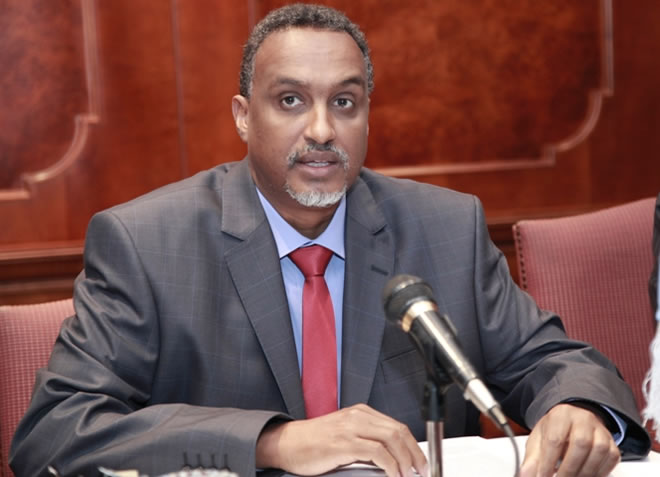Hiiraan Online
Thursday, July 2, 2015

Finance Minister of the Government of Somalia Mr. Mohamed Adan Ibarhim (Farkeeti)
MOGADISHU (HOL) - The Finance Minister of the Government of Somalia Mr. Mohamed Adan Ibarhim (Farkeeti) stated before parliament last week that all public servants have been without salary for four months. This extraordinary confession was public knowledge for months and public servants in all sectors including the civil service, security forces and the police had been complaining loudly to get the issue dealt with urgently.
In a Mogadishu restaurant six police officers told HOL that many of them are facing homelessness and the prospect of not been able to provide food for their families.
“We have not had salaries since January and yesterday the shop I borrowed food from for my family stopped lending to me,” said one of the policemen who did not want to be named.
Another Policeman had already been evicted from his home and he and his young family had moved back in with his mother.
“It is very sad that we are working so hard to help our people and we are becoming homeless,” said the policeman who again did not want to be named. “The fact is that my mother and five brothers depend on me too.”
All the Policemen understood that no public servant had not been paid since January and all blamed the Government and the donors who promised to contribute to rebuilding Somalia when the current Government was formed in 2012.
“I am sure both the Government of Somalia and the international community are equally to blame but since we don’t work for the international community we can only hold our government responsible,” said another policeman.
Employees working in Government Ministries have not had better luck and most have not been paid since January too.
“Life is hard definitely and I am struggling everyday but I still go to work because all of the public servants are suffering like me,” said Ahmed Mohamed who is employed as a secretary in one of Somalia’s many Ministries.
“I used to live in a room with colleagues from my Ministry and we are now all facing eviction if we don’t pay our rent this month,” said another public servant who did not want to be named. “If it happens, we have to return to live with family and my problem is that I am the only one living in Mogadishu from mine.”
While public servants had been assured by the Ministry of Finance that some salaries will be paid within the month of Ramadan most are not expecting much.
“Even if we are paid it will be for just one month and not the full period,” said Ahmed Omar, an adviser to the Government. “What will this do for me? Which debt should I pay first?”
“There is no point in just getting one month pay because all your debtors crowd around and you don’t know who to pay and if you don’t pay one but you pay the other you lose an essential service and friends,” added Ahmed’s colleague in frustration. “If we don’t get all the salary we are owed it will not be a good Ramadan or Eid for us and our families who depend on us.”
The Minister for Finance stated before Parliament that, while the revenue collection was going well, the country was not making enough to service its needs quickly enough. He also blamed the international community which pledged to pay 51% of the cost of running the Government for not acting quickly enough in fulfilling their promises.
Most public servants interviewed by HOL felt that the Minister of Finance was not been totally honest and that much had left the system through corruption.
“When the Minister was asked how much money the President and the Prime Minister took on their travels abroad he refused to say,” stated a policeman who did not want to be named. “That is why I think the international community is making things hard: there is little honesty from our government.”
The late and drip-drip process of salary payments to public servants in Somalia has had a large effect on the local economy.
“Many of my customers work for the Government and all of them have no salary so I give them credit but I have stopped since last month because I am frightened they cannot pay the debts back,” said Munira who owns a food store in the Hodan district of Mogadishu.
Other traders felt trapped too and while most did not want to refuse public servant customers credit, all worried about their ability to pay back.
“We have to respect people working for our Government because it is a risky job but we also need to pay for the goods we are selling to those we brought it from,” said an employee of the electricity company. “The Government must be more responsible and organised to pay for its staff like any other business.”
Many public servants told HOL that they are experiencing enormous pressures and that as a result their morale is at rock bottom. They also all admitted that this is affecting their ability to carry out their duties effectively. Many went further and said that had they had other opportunities available to them they would leave public service altogether because they were not valued.